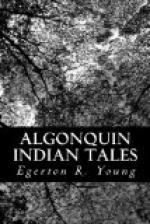The old man, genuine Indian that he was, was much moved by her winsome ways and handsome gift.
He said but little, but there was a soft, kindly look in his eyes that showed his gratitude more than any words could have done. It meant a good deal more than perhaps he would like to admit and those who saw it were thankful that they had observed it, knowing that it meant so much. Sagastao, who had already given him several presents, had held on to his box of candies. He had learned that for such things the old man could be coaxed to do almost anything, and now he held them out, and said:
“Now, Souwanas, as all the presents have been passed around, I have got some fine sweeties for you, but we must have a first-class Nanahboozhoo story for them.”
“O yes!” said Minnehaha. “And as it is to be for sweeties let us have a nice sweet story of Nanahboozhoo this time.”
“A sweet story you want? Well, before I begin let us fix up the fire and all get comfortably seated around it.”
Then, as they usually did, the two white children cuddled as close to the inimitable story-teller as they could. Little cared they for the cold without or even for the occasional puffs of smoke which seemed at times to prefer to enter the eyes of the listeners rather than to go out at the orifice at the top of the wigwam.
“A sweet story,” musingly said the old man, “in this land of fish, and bears, and wolves, and wildcats, and wolverines!” Then he paused long enough to fill his mouth again with the candies which he enjoyed so much.
“A sweet story. Then it must be of a land, south of this, where for some years I dwelt, many, many moons ago. A land where the Se-se-pask-wut-a-tik (sugar maple tree) grows and flourishes in all its beauty.
“There, in those wigwams, long ago lived the people whom we call the Hurons, the Dakotahs and the Ojibways. These Ojibways are cousins of my own people, the Saulteaux. Well, the story I want to tell you had its beginning long, long ago. One day there came a great embassage of Indians from the far South with words of peace and good will. They said that in their country they had no cold weather, and very seldom saw any snow. They said that the trees were different, and that many things grew there that they did not see in our Northern country. They brought with them many presents and were kindly received by our people, and then, after some weeks of feasting and speech-making, they returned home laden with the best gifts our tribes could bestow.
“Among the presents which these Southern Indians brought was a large quantity of sugar. This was the first time it was ever seen among the Indians of the North. It was very much prized, and was very carefully divided among the people so that each one had a small quantity. It did not last very long, for everybody was fond of it. When it was all gone the people were sorry, and the question was asked, ’Why cannot we send a company of our own people and get more of it?’




